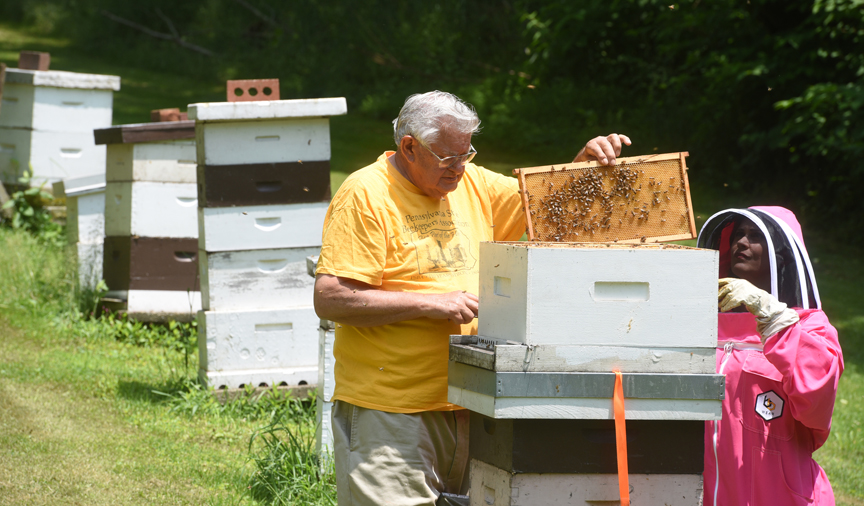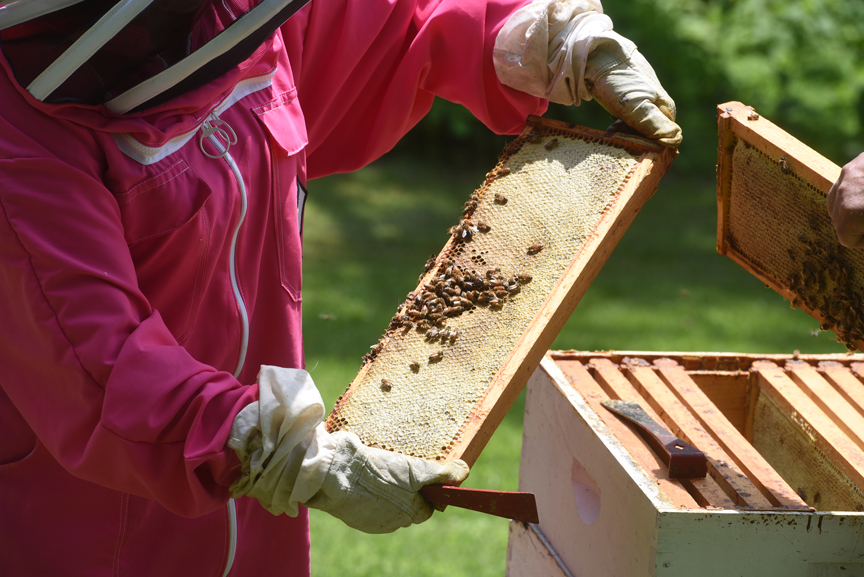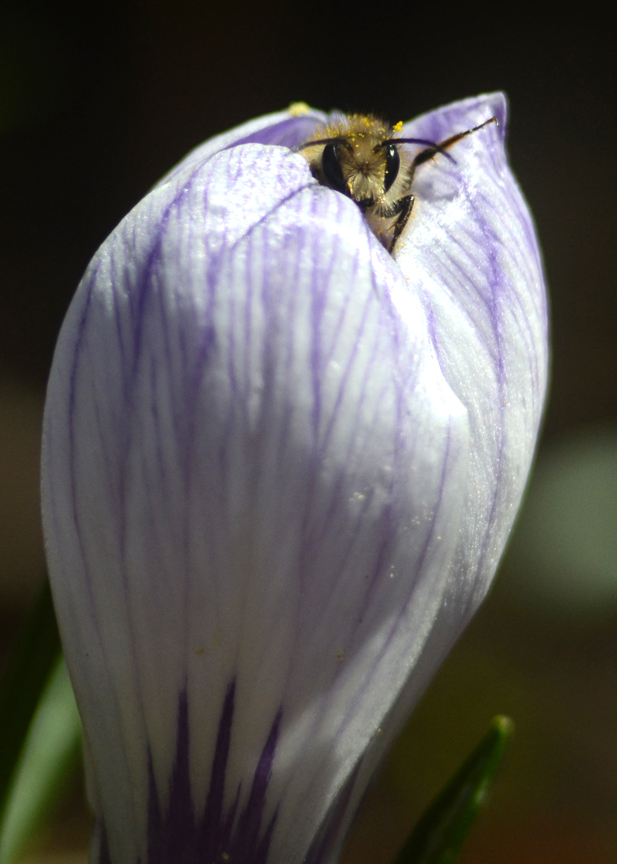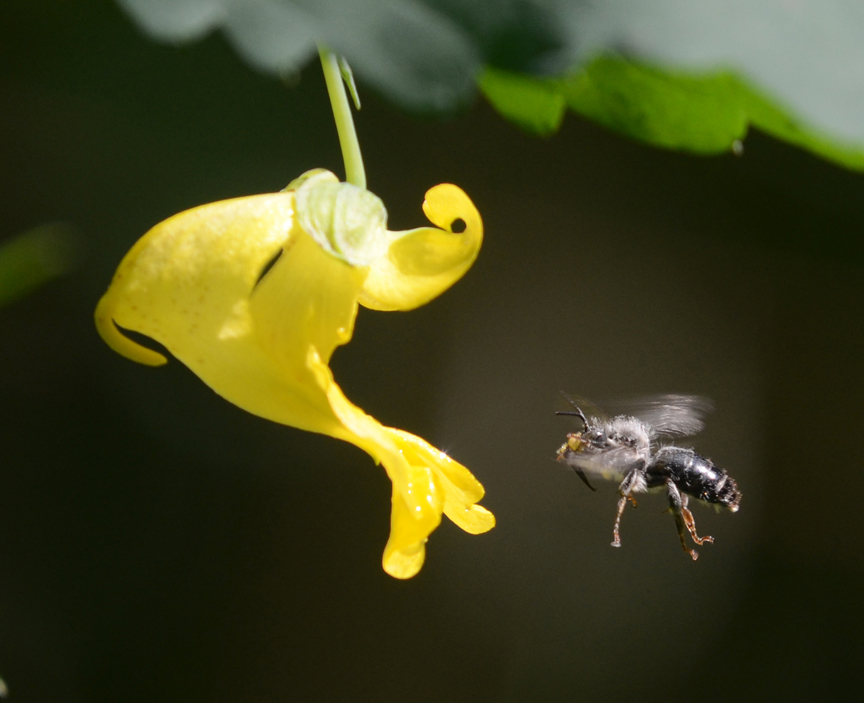Honeybees on city rooftops cared for by The Best Bees Company helps pollinators
Posted on: June 11, 2019 | Written By: Doug Oster |
Jim Fitzroy is attempting to give away his recipe for something called hot honey as his friend Michelle Wright tries hard (with a wink) to keep the ingredients a closely guarded secret. Wright is a WTAE-TV news anchor as well as a beekeeper who shares a love of bees with Fitzroy. The two are just finishing some square cut pizza that’s been dipped in the sweet and savory concoction infused with hot peppers. It might seem like an unlikely combination, but it’s delicious.
The two partnered as beekeepers years ago and share around 70 hives between them, with many at Fitzroy’s Verona home. They have also started working for The Best Bees Company, which installs and manages honeybee hives for home gardens and on business rooftops in 18 states, including Pennsylvania.

Michelle Wright, WTAE-TV anchor and beekeeper (right) inspects a frame of bees with Jim Fitzroy at his home. The two are working for The Best Bees Company, caring for bee hives on top of buildings in Pittsburgh. Photos by Doug Oster

Michelle Wright inspects a frame of bees with Jim Fitzroy at his home.

Early flowering plants like a crocus provide a source of food for honeybees. The Best Bees Company is another business trying to help pollinators.
Fitzroy is a longtime beekeeper, and those who know him consider him a true expert on the subject.
“He knows what’s going on in the hive before even opening it,” Wright says fondly of her bee partner.
She became enamored with bees while doing stories when colony collapse disorder first appeared.
“I just became fascinated, learning about what was going on inside the hive and the importance of bees,” Wright says.
She called Fitzroy and asked, “If I buy a hive, will you make sure I won’t screw it up?”
Wright started by coming weekly to inspect the hive and learn about bee biology from Fitzroy, who will turn 78 in July. The hive doubled in size, and there was no stopping her. Now the two of them split all the honey they harvest — and much of the work involved in keeping their bees happy.
“I love it, I find it really soothing,” she says with a smile. “There’s something magical about opening a hive and hearing that loud buzz around you. But then just concentrating, forgetting about everything else going on, looking for the queen, looking for eggs. Life can be so, so stressful outside of this.”
It’s interesting to see the two work the bees in consort. Fitzroy drifts white smoke over the hive to calm the bees, and he’s not wearing any protection at all.
“I suit up full force,” Wright says with a laugh. Today she’s wearing a full-length hot pink bee suit to avoid being stung.
Fitzroy accidentally squeezes a bee and gets stung, but shrugs it off without concern. Wright can’t afford to be stung, especially around the face, as she makes a living on camera.
“They are really important,” she says of the bees. “We need to focus on what’s bothering them. We’re so famous for Rachel Carson here and the care she took of our planet, we really need to think about that. We have to take care of the planet; something is happening.”
Fitzroy remembers the days when a gas station attendant would have to clean the bugs off his windshield at every fill-up.
“Now you can drive from here to Florida and not kill a bug, good or bad,” he says. “It’s not only the bees that are having problems, it’s all the insects.”

This honeybee visits a jewelweed flower.
Both beekeepers are thrilled to be part of Best Bees, as research is an important component of the business.
“I think one of the most important things that Best Bees was finding is bees that live in the city live longer and make more honey than bees that are in the wild, in the countryside,” Wright says.
Fitzroy was doubtful that bees on an eight-story building would thrive, but they are doing spectacularly. The duo tends four hives on BNY Mellon and the Nova building on the North Side for Best Bees.
The view is spectacular, Wright adds, but there’s more than the sights of the city when thinking about the bees. “When you look around on Mount Washington and going up the North Shore,” she says, “there’s a lot of plant life. Pittsburgh is green.”
Every time the pair visits a hive, they are entering data into an app that helps gather information about the bees.
“You feel like you are contributing to something that’s going to make a difference,” Wright says.
That’s exactly what Noah Wilson-Rich, founder and chief scientific officer of The Best Bees Company, wants.
“Our mission is to improve bee health,” he says. “We’re trying to improve the survival and productivity of bees.” That’s not just honeybees, he adds. Bumblebees, carpenter bees and other pollinators are all on his list of species he’s trying to help.
The company has around 1,000 hives across the county being cared for by beekeepers, like Wright and Fitzroy, who are employees of the company. He’s always looking for other businesses and homeowners to be part of the project. It’s a subscription service where the company installs and cares for the hive for a fee.
There’s another interesting component to Best Bees. They offer nurseries and garden centers the chance to buy special tags for pollinator plants that label them as Best Bee-certified.
Wilson-Rich, who has a doctorate in bee health, hopes his work and research can reverse the decline of the bee population and other pollinators.
“We want people to feel empowered with this bigger issue. You know bees are dying, how can we save them? This is one way that anybody can do it,” he says. “If you’ve got a garden, if you have a rooftop, consider putting a bee hive there. Whether you’re the beekeeper or whether you hire a beekeeper like us, these are ways you can actually make a difference.”
Doug Oster is editor of Everybody Gardens, a website operated by 535Media, LLC. Reach him at 412-965-3278 or doster@535mediallc.com. See other stories, videos, blogs, tips and more at everybodygardens.com.